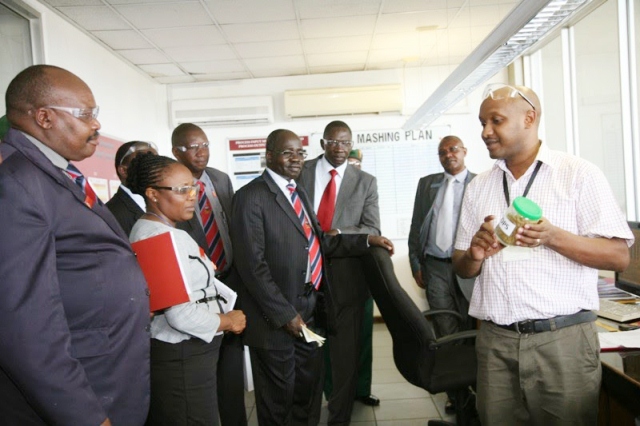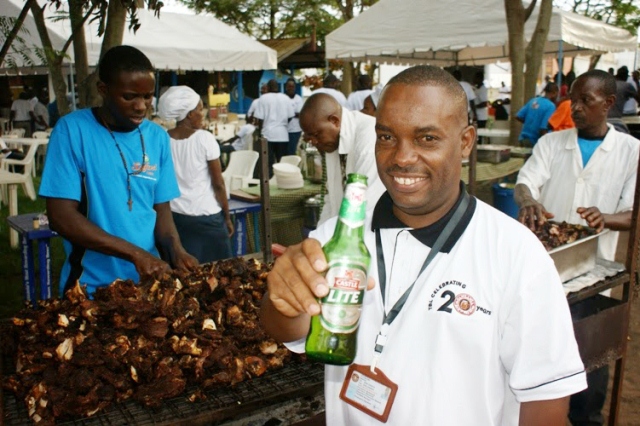By TZ Business News Staff.
The Tanzania Breweries Limited (TBL) operating profit for the period ended 30 September 2014 was 17% ahead of the prior year, the company’s Managing Director Roberto Jarrin has said in a statement. The profitability came despite depreciation of Tanzanian Shilling over the period which increased the cost of imported production materials.
Total cash generated from operations amounted to Tshs 180 billion, of which Tshs. 39 billion was utilised to pay corporate tax, while the remaining Tshs. 141 billion funded interest and capital expenditure as well as paying dividends of Tshs 74 billion to company shareholders, Jarrin said in the statement.
Tanzania Breweries Limited Group of Companies has delivered a satisfactory set of results for the six months ended 30th September 2014 despite challenging market conditions. Revenue growth of 8% over last year was driven by price increase following the 20% increase in excise duty as well as a positive product mix.
The growth in earnings was achieved through a favourable product mix, improved efficiency as well as focused cost management whilst operating in a challenging environment. Jarrin said overall [production] volumes in Tanzania declined for the half year compared to the same period during the prior year. The decline was largely driven by “lower consumption following the 20% increase in excise duty on beer, which was passed onto consumer in July 2014.”
“The majority of our brands were negatively affected by this significant increase in excise duty,” he said.
TBL, a subsidiary of South African Breweries International (Now SABMiller), produces and distributes malt beer, non-alcoholic malt beverages. The company operates four breweries located in Dar es Salaam, Arusha, Mwanza and Mbeya.

TBL Dar es Salaam production plant officer, Kelvin Nkya (R) gives factory tour to Kenya Military officers dressed in civilian attire in December, 2014 (Photo Credit: Muhidini Michuzi)
The Tanzanian government entered into a joint venture agreement with South African Breweries International to run TBL from 1993 through a USD$22.5 million investment in TBL. The agreement gave the South African brewer 50% ownership of the Company.
SABMiller is the second largest alcoholic drinks producer in the world and reported to be one of the most efficient brewing companies in the world. It is credited for turning TBL around with extraordinary speed, almost tripling production in a space of three years after the onset of the joint venture.
TBL was listed on the DSE September 9, 1998, through a successful IPO. This made it the second listing on the bourse since its formation. In 2002, The UK-based brewer Diageo backed the Kenyan-based East African Breweries Limited (EABL) to acquired a 20% equity stake in TBL after it (EABL) signed license agreements with South African Breweries International and agreed to issue SABI a similar share in Kenya Breweries Limited.
In the agreement, SABMiller exited the Kenyan market while EABL exited the Tanzanian market by handing over its Kibo subsidiary to TBL. This partnership gave TBL 98% share of the Tanzanian market by the year 2004. But this arrangement was short lived.
In 2010, EABL ended its agreement with TBL and bought a 51% stake in Serengeti Breweries, the TBL rival beer maker in Tanzania. EABL disposed its 20% stake in TBL for $71.5 million through a secondary offer on the DSE in 2011. TBL reported a drop in market share from 98% in 2004 to 74% for the alcoholic beverages market in Tanzania as at March 31, 2013.
Competition is in the meantime expected to continue building up as SABMiller’s rival, Deageo, announces steps to heighten operations in East Africa. The Diageo Plc’s Kenyan unit plans to expand operations in South Sudan and other nations in East Africa to capitalize on accelerating economic growth in the region, the unit’s Chief Executive Officer Charles Ireland was quoted in the media as saying 12 months ago.
The Kenya-based East African Breweries Ltd is considering growing its distribution infrastructure in South Sudan, Ireland said in an interview Nairobi, where the company is based.
“We are looking to migrate from trading to fully operational business units” in South Sudan, Rwanda and eastern Democratic Republic of Congo, he said.
EABL, as the company is known, reportedly controls 95 percent of the Kenyan beer market and half of the country’s spirits business, according to Ireland. The company has manufacturing plants in Kenya, Uganda and Tanzania and exports its products to Rwanda, the Democratic Republic of Congo and South Sudan. EABL operates in Tanzania through Serengeti Breweries Limited (SBL).
In another development, SABMiller has signed an agreement with the American Coca-Cola Company and the Gutsche Family Investments (GFI, majority shareholders in the South African-based Coca-Cola Sabco) to combine bottling operations of their non-alcoholic ready-to-drink beverage businesses in Southern and East Africa. The agreement results in a new joint venture company.
The new bottler, Coca-Cola Beverages Africa, will serve 12 high-growth countries accounting for approximately 40 per cent of all Coca-Cola beverage volumes in Africa, according to media reports.
Africa offers significant growth potential in beverages, underpinned by rising personal disposable income, a fast-growing population and increasing per capita consumption. With more than 30 bottling plants and over 14,000 employees, Coca-Cola Beverages Africa will be the largest Coca-Cola bottler on the continent, with the scale, complementary capabilities and resources to capture and accelerate top-line growth.
“Soft drinks are an important element of our growth strategy. This transaction increases our exposure to the total beverage market in Africa. The opportunity is significant, with favourable demographics and economic development pointing to excellent growth prospects,” said Alan Clark, SABMiller Chief Executive. “This also signifies a strengthening of our strategic relationship with The Coca-Cola Company.”
Phil Gutsche, Chairman of Gutsche Family Investments (GFI), said, “Our family sees this merger as an important and logical step to enable Coca-Cola Beverages Africa to optimise the opportunities for development in the rapidly-evolving Africa beverage market. We are very excited about the opportunity and are totally committed to ensuring that Coca-Cola Sabco’s distinctive culture is successfully integrated with that of our new partners in order to create an even more successful business in the future.”
Coca-Cola Beverages Africa will initially produce and distribute Coca-Cola beverages in nine countries: South Africa, Kenya, Ethiopia, Mozambique, Tanzania, Uganda, Namibia, Comoros and Mayotte.
“A combined Coca-Cola bottling operation is further evidence of our commitment to Africa, and our firm belief in the tremendous growth prospects that the continent offers,” said Muhtar Kent, Chairman and CEO of The Coca-Cola Company. “As one of the top 10 largest Coca-Cola bottling partners worldwide, Coca-Cola Beverages Africa can leverage the scale, resources, capability and efficiency needed to accelerate Coca-Cola growth and contribute to the economic and social prosperity of African communities.”
Phil Gutsche will be Chairman of Coca-Cola Beverages Africa and Port Elizabeth, South Africa is the intended location for the company’s headquarters.




